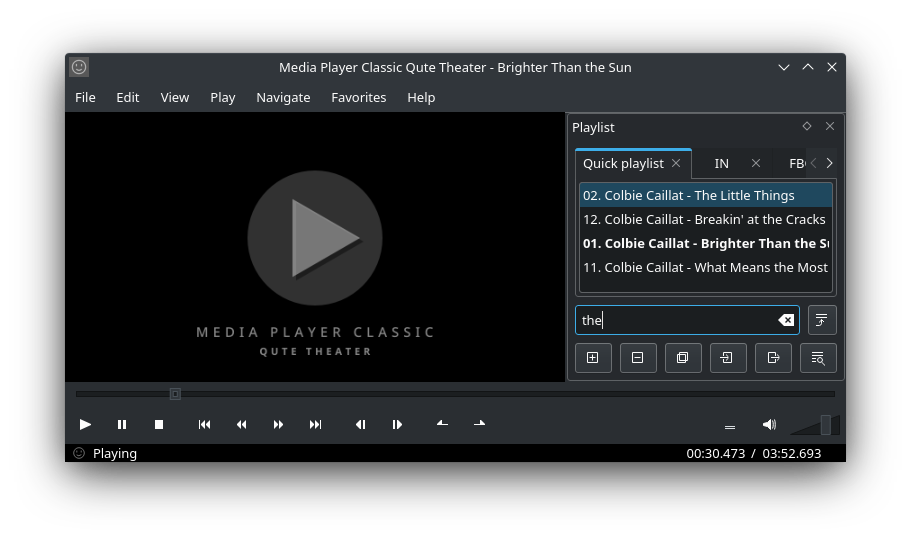A clone of Media Player Classic reimplemented in Qt.
Media Player Classic Home Cinema (mpc-hc) is considered by many to be the quintessential media player for the Windows desktop. Media Player Classic Qute Theater (mpc-qt) aims to reproduce most of the interface and functionality of mpc-hc while using libmpv to play video instead of DirectShow.
There are builds for Windows users on the release page; these use time-based versioning (e.g. 17.07 corresponds to a 2017 July). The are also build artifacts from Github actions.
Note that unimplemented features in the options dialog are hidden and (where this is not possible) disabled. This is to preserve the familar options layout from mpc-hc in the meantime.
Clone: Nearly everything that mpc-hc does for the casual user.
Multiple playlists: When you're watching shows on your backlog, load every show into separate playlists and still keep track of the last played file for each playlist. Finally you can eliminate the need to keep track of your progress in a spreadsheet, all while never leaving the comfort of your favorite media player.
Quick queuing: Out-of-order playback in the same style of xmms/qmmp. Got some compilation albums in a playlist, but want to hear only some rock tracks for a while? Now you can, without obliterating your playlist.
Playlist searching: Multi-threaded playlist searching, in the same style as other media players. Find the tracks you want, when you want them.
Screenshot templates: Take screenshots with a custom, sleek and stylized filename. Only include the information that you want.
Looped playback: Selectively show part of video/music tracks. Amazing, isn't it?
Custom metadata: Display custom metadata in the playlist window. Want to show the artist as well as the title, down to even the encoder used? Nothing is stopping you.
Race Inspired Cosmetic Enhancements: In-app custom styling support. Make the app go faster!
These features are wishlist items and are subject to the developer's time.
Encoding support like VirtualDub: Churn out clips faster. No need to open a video editor when your media player can do your job for you. Requires writing an encoder-orientated backend.
Suggestions welcome.
If you are a coder, try to follow the conventions in the code and make a PR. If you are a translator, we will be using Weblate to translate.
The best version is git master, and everyone are encouraged to increase their computer-fu by compiling from source. (see sections below.) Compiling from source gives you several advantages over the usual user, such the ability to use latest and pre-release software regardless of where it comes from. Unix users, there could even be packages in your distro that help with this. (e.g. aur, ports.)
You need the Qt6 SDK installed and a recent edition of libmpv. On Ubuntu you
can usually install the required libraries and tools with the
build-essential, qmake6, qt6-base-dev, qt6-l10n-tools, libqt6svg6-dev,
and libmpv-dev packages. A recent edition of libmpv means either from git
head or at least version 0.37.0. The mpv options for this are
--enable-libmpv-shared for shared library support, and
--enable-libarchive if you want to use mpc-qt as a comic book viewer.
First ensure you have the prerequisites as mentioned above, then open a terminal
and cd into your general source-code directory. If one does not exist,
mkdir one.
mkdir src
cd ~/src
Then clone this git repository using the following command:
git clone https://github.com/mpc-qt/mpc-qt.git
Finally, cd into the checked-out repository.
cd mpc-qt
Then build with qmake+make.
qmake6
make -j`nproc`
sudo make install
You're done! Later on, performing a git pull from inside the source code directory will get the latest changes.
git pull origin master
Rebuild by following the qmake+make steps as described above.
Some distros have an ancient version of mpv in their repos. You can install libmpv in the following method:
Uninstall any libmpv package you may have.
sudo apt purge libmpv-dev
Fetch the mpv-build repo.
cd ~/src
cd mpv-build
Select the master versions to compile.
./use-ffmpeg-master
./use-libass-master
./use-mpv-master
Follow the instructions for debian and ubuntu about making a build-deps package. (or whatever method for your distro.)
sudo apt-get install git devscripts equivs
rm -f mpv-build-deps_*_*.deb
mk-build-deps -s sudo -i
Build libmpv.
echo --enable-libmpv-shared > mpv_options
./update
./build -j`nproc`
sudo ./install
sudo ldconfig
libmpv should now be installed to /usr/local/*.
While this program is meant for Unix, it is possible to compile it on Windows with MSYS2. MSVC is not supported due to the nature of the build process, but may work in theory if you throw enough stubbornness at it.
From a fresh installation of MSYS2, run the following from an MSYS2 MINGW64 prompt. First, update the packages
pacman -Syu
Restart MSYS2 MINGW64 when prompted to do so and re-run pacman.
pacman -Syu
At this stage packages required for building can be installed. (Copy and paste this as one line.)
pacman -S base-devel git mingw-w64-x86_64-toolchain mingw-w64-x86_64-clang mingw-w64-x86_64-cmake mingw-w64-x86_64-qt6 mingw-w64-x86_64-qt-creator mingw-w64-x86_64-qt6-doc mingw-w64-x86_64-imagemagick mingw-w64-x86_64-librsvg mingw-w64-x86_64-inkscape
At time of writing, there is slight bug in qmake where it looks for the wrong version of lupdate/lrelease. Create the required symlinks.
ln -s lrelease-qt6.exe /mingw64/bin/lrelease.exe
ln -s lupdate-qt6.exe /mingw64/bin/lupdate.exe
Mpc-Qt can be compiled with a libmpv linked to MSYS2's ffmpeg libraries, or by
using the prebuilt library released on sourceforge. To use the prebuilt
library after cloning this repository, download libmpv from shinchiro's
release page, and extract it somewhere. Place the files in the root folder
of mpv-dev-x86_64-*.7z into mpv-dev/lib. Then place the files in its include
folder into mpv-dev/include/mpv. If you do this, compile with the
ENABLE_LOCAL_MPV=1 option.
qmake6 ENABLE_LOCAL_MPV=1 mpc-qt.pro
make -j`nproc`
Congratulations, you have now built mpc-qt!
